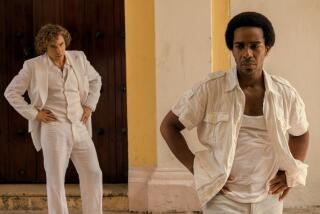Ex-Panther Says He Saw Cleaver Kill a Man
- Share via
An air hijacking fugitive who was returned to the United States last month has told the FBI that while living in Algeria in the early 1970s, he saw Black Panther Party leader Eldridge Cleaver murder a fellow party member he suspected of having an affair with his wife.
The allegations are contained in documents filed Friday in Los Angeles federal court, where Byron Vaughn Booth, 56, faces charges of air piracy and kidnapping.
A fugitive for 32 years, Booth was arrested by Nigerian authorities last month and deported to the United States. He is accused of hijacking a National Airlines jet from the United States to Cuba in 1969 after escaping from the California Institution for Men in Chino, where he was serving a term for armed robbery.
Two months before his arrest, Booth met with an FBI agent at a Lagos restaurant and spoke about the slaying of Clinton Robert Smith Jr., a fellow escapee from Chino who allegedly helped him carry out the air hijacking.
According to a transcript, Booth told the agent that after a brief stay in Cuba, he and Smith went to Algeria, where they served on Cleaver’s staff. Cleaver, who died in 1998, was a fugitive himself at the time, having jumped bail and fled the United States following a shootout with Oakland police.
Booth said that he accompanied Cleaver on a trip to North Korea and that, while they were gone, Smith had an affair with Cleaver’s wife, Kathleen.
Upon returning, Booth said, Cleaver began taping calls at his home. “On some of the tapes Clinton was discussing with Kathleen killing Eldridge and taking over the party headquarters in Algeria,” Booth said, according to the transcript.
One evening, Booth related, Cleaver invited Smith and Booth to his house in Algiers and gave them a newspaper article to read. When Booth looked up, he said, Cleaver was holding an AK-47 rifle.
He said Cleaver accused Smith of having an affair with his wife, and then: “Eldridge . . . shot Clinton through the heart.”
Booth said Cleaver dumped the body in a nearby field and poured acid over it.
“The next day, I decided to leave Algiers,” Booth said, “because I didn’t join the party this time killing party members (sic).”
The FBI has said it has not been able to confirm Smith’s death and he is still listed as a fugitive. Reports of Cleaver killing a fellow Panther in Algeria, however, have surfaced in the past. At the time of a Black Panther split in 1971, the party’s official newspaper, based in Oakland, included an article accusing Cleaver of killing an unnamed member who had had an affair with his wife, according to the Associated Press.
Cleaver, who later returned to America, renounced political radicalism and became a born-again Christian and a Republican. He died of a heart attack in 1998 while living in relative obscurity in the Pomona-Fontana area.
Kathleen Cleaver did not return phone calls to her home in Connecticut Friday. The couple divorced in 1987.
According to the court documents filed Friday, Booth also told the FBI that he and Smith made their escape from a Chino minimum-security building with the help of an underground organization and a teacher who worked at the prison. Booth did not identify either one.
After scaling a security fence under the cover of darkness, Booth said, he and Smith made their way to a nearby highway and waited for the teacher to pick them up.
Inside the car, he said, were a change of clothes for each man, along with a gun and several hundred dollars in cash, provided by the underground group. “We changed in the car and he took us directly to Los Angeles International Airport,” Booth said.
The next morning, Booth and Smith bought one-way tickets on National Airlines Flight 64, bound for Miami with a stopover in New Orleans.
After the flight left New Orleans and headed out over the Gulf of Mexico, the pair commandeered the plane, wielding a .38-caliber handgun and what they claimed were four sticks of dynamite.
When the DC-8 landed in Cuba, Booth and Smith were taken into custody by security officials, and the plane, with its crew and remaining passengers, was allowed to return to the United States. Booth said he and Smith were held in a Cuban prison for two months until Cleaver arranged for their release. Afterward, he said, they stayed with Cleaver at an apartment in Havana and accompanied him when he relocated to Algeria.
After leaving Algeria, Booth made his way to Egypt and then to Nigeria, where he spent most of his years as a fugitive.
Since 1989, the FBI said, Booth has made intermittent contacts with U.S. authorities, trying to negotiate a deal that would allow him to return and face a reduced prison sentence. At their last meeting on Jan. 19, an FBI legal attache told Booth there would be no deal and that Nigerian police were about to arrest him.
With that, the FBI said, Booth shoved the agent aside, dived into a waterway and tried to swim away but eventually was captured.
Now in Los Angeles, Booth is scheduled to make his first court appearance on March 15. He is being treated at a prison medical facility for an undisclosed illness.
More to Read
Sign up for Essential California
The most important California stories and recommendations in your inbox every morning.
You may occasionally receive promotional content from the Los Angeles Times.









